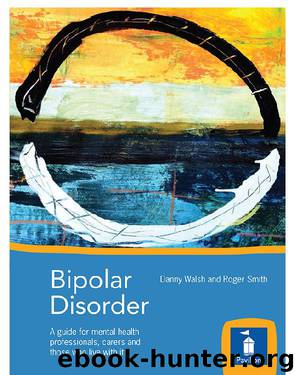Bipolar Disorder by Roger Smith

Author:Roger Smith
Language: eng
Format: epub
ISBN: 978-1-908066-15-2
Publisher: Pavilion Publishing
Published: 2013-07-24T16:00:00+00:00
In the previous quote, a key point is that recovery is ‘defined by the person themselves’. Health professionals cannot define recovery for an individual. It is necessary that health professionals listen to the person’s hopes for the future in order to understand their ideas about recovery. It is also worth noting that recovery can happen without the help of health professionals and in some cases not everyone aims to recover.
It is often useful to think of recovery as being a journey rather than a destination - a process rather than a place. Bipolar people who have had many episodes may not see themselves on a journey of recovery. They may see their life as more of a journey of discovery. However much you believe in recovery, such alternative views need to be respected and appreciated because they are just as valid. What others call discovery, self-management or another name is likely to have the same principles as recovery.
Wellness Recovery Action Plans
The National Institute for Mental Health issued a Guiding Statement on Recovery in 2005, which set out the principles for recovery-based work. Principle 9 stated that ‘Users of services with the support of clinicians, practitioners and other supporters should develop a recovery management or wellness recovery action plan’. These ‘written’ plans derive from the work of Mary Ellen Copeland in the 1980s and include the following.
Tools: identifying tools to help develop a healthier lifestyle. Things the person has done in the past or which they could do to help them move towards wellness.
Maintenance: things the person needs to do in order to maintain wellness, such as ensuring a good diet, sleep and exercise.
Triggers: identifying what could cause stress and relapse and identifying what to do about such triggers.
Early warning signs: identifying signs such as irritability or anxiety which tell the person their symptoms are getting worse. This will include self-monitoring of symptoms.
Crisis management plans: for when all else fails, these outline the person’s wishes, what they want others to do for them and how they want to be treated and cared for.
WRAP plans also include ideas for building self-esteem and self-management.
Download
This site does not store any files on its server. We only index and link to content provided by other sites. Please contact the content providers to delete copyright contents if any and email us, we'll remove relevant links or contents immediately.
Should I Stay or Should I Go? by Ramani Durvasula(7642)
Why We Sleep: Unlocking the Power of Sleep and Dreams by Matthew Walker(6688)
Fear by Osho(4724)
Flow by Mihaly Csikszentmihalyi(4674)
Rising Strong by Brene Brown(4439)
Why We Sleep by Matthew Walker(4423)
The Hacking of the American Mind by Robert H. Lustig(4358)
How to Change Your Mind by Michael Pollan(4342)
Too Much and Not the Mood by Durga Chew-Bose(4324)
Lost Connections by Johann Hari(4165)
He's Just Not That Into You by Greg Behrendt & Liz Tuccillo(3874)
Evolve Your Brain by Joe Dispenza(3654)
The Courage to Be Disliked by Ichiro Kishimi & Fumitake Koga(3475)
Crazy Is My Superpower by A.J. Mendez Brooks(3382)
In Cold Blood by Truman Capote(3367)
Resisting Happiness by Matthew Kelly(3332)
What If This Were Enough? by Heather Havrilesky(3299)
The Book of Human Emotions by Tiffany Watt Smith(3285)
Descartes' Error by Antonio Damasio(3264)
